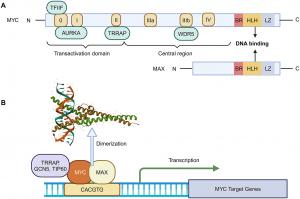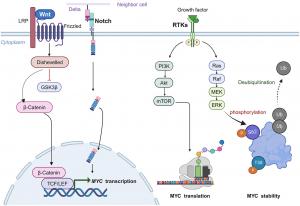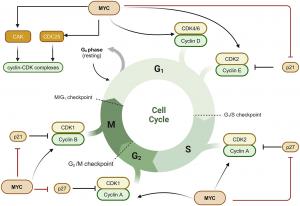SHANNON, CLARE, IRELAND, May 12, 2025 /EINPresswire.com/ -- A new review in Genes and Diseases explores the central role of MYC, a master regulatory protein, in the development and progression of cancer, spotlighting its potential as a multidimensional therapeutic target. MYC is dysregulated in nearly 70% of human cancers, where it influences a vast network of biological processes including cell cycle control, metabolism, apoptosis, angiogenesis, and immune evasion. The article underscores how MYC not only drives aggressive tumor behavior but also contributes significantly to drug resistance, making it one of the most compelling yet complex targets in oncology.
Historically considered undruggable due to its disordered protein structure, recent advances have begun to shift this paradigm. Researchers are now devising strategies to target MYC directly by interfering with the MYC-MAX protein complex, which activates numerous cancer-related genes. Promising compounds, such as OMO-103, have demonstrated early clinical potential by disrupting this interaction and halting tumor proliferation.
Beyond direct approaches, the review also emphasizes indirect targeting strategies, including inhibition of MYC transcription or translation, promotion of protein degradation, and synthetic lethality—wherein pathways essential to MYC-overexpressing cells are selectively disrupted. These methods aim to exploit the vulnerabilities of cancer cells that depend heavily on MYC for survival, while sparing healthy tissues.
The therapeutic potential of MYC targeting is further enhanced by innovations in small molecule inhibitors, protein degradation technologies like PROTACs, and combination therapies that integrate MYC inhibition with existing treatments. These approaches are being designed with an eye toward precision medicine, tailoring interventions based on tumor-specific MYC activity and associated molecular pathways.
However, the article cautions against oversimplification. Because MYC interacts with a wide array of partners and affects diverse signaling cascades, context-dependent effects must be carefully considered. Targeting MYC too broadly might risk unintended consequences, such as impairing normal regenerative processes or inducing premature cellular aging.
Still, with improved molecular understanding and refined drug design, the tide is turning in favor of MYC-directed interventions. This review calls attention to MYC as not just a notorious oncogene, but a gateway to novel, more effective cancer treatments—redefining what is therapeutically possible for one of the most elusive yet consequential drivers of malignancy
# # # # #
Genes & Diseases publishes rigorously peer-reviewed and high quality original articles and authoritative reviews that focus on the molecular bases of human diseases. Emphasis is placed on hypothesis-driven, mechanistic studies relevant to pathogenesis and/or experimental therapeutics of human diseases. The journal has worldwide authorship, and a broad scope in basic and translational biomedical research of molecular biology, molecular genetics, and cell biology, including but not limited to cell proliferation and apoptosis, signal transduction, stem cell biology, developmental biology, gene regulation and epigenetics, cancer biology, immunity and infection, neuroscience, disease-specific animal models, gene and cell-based therapies, and regenerative medicine.
Scopus CiteScore: 7.3
Impact Factor: 6.9
# # # # # #
More information: https://www.keaipublishing.com/en/journals/genes-and-diseases/
Editorial Board: https://www.keaipublishing.com/en/journals/genes-and-diseases/editorial-board/
All issues and articles in press are available online in ScienceDirect (https://www.sciencedirect.com/journal/genes-and-diseases ).
Submissions to Genes & Disease may be made using Editorial Manager (https://www.editorialmanager.com/gendis/default.aspx ).
Print ISSN: 2352-4820
eISSN: 2352-3042
CN: 50-1221/R
Contact Us: editor@genesndiseases.com
X (formerly Twitter): @GenesNDiseases (https://x.com/GenesNDiseases )
# # # # # #
Reference
Yingying Duan, Zhaoshuo Liu, Qilin Wang, Junyou Zhang, Jiaxin Liu, Ziyi Zhang, Chunyan Li, Targeting MYC: Multidimensional regulation and therapeutic strategies in oncology, Genes & Diseases, Volume 12, Issue 4, 2025, 101435, https://doi.org/10.1016/j.gendis.2024.101435
Funding Information:
National Natural Science Foundation of China 32270610
National Natural Science Foundation of China 82072499
National Natural Science Foundation of China 31801094
Fundamental Research Funds for the Central Universities (China) YWF-21-BJ-J-T105
Genes & Diseases Editorial Office
Genes & Diseases
+86 23 6571 4691
editor@genesndiseases.com
Legal Disclaimer:
EIN Presswire provides this news content "as is" without warranty of any kind. We do not accept any responsibility or liability for the accuracy, content, images, videos, licenses, completeness, legality, or reliability of the information contained in this article. If you have any complaints or copyright issues related to this article, kindly contact the author above.




